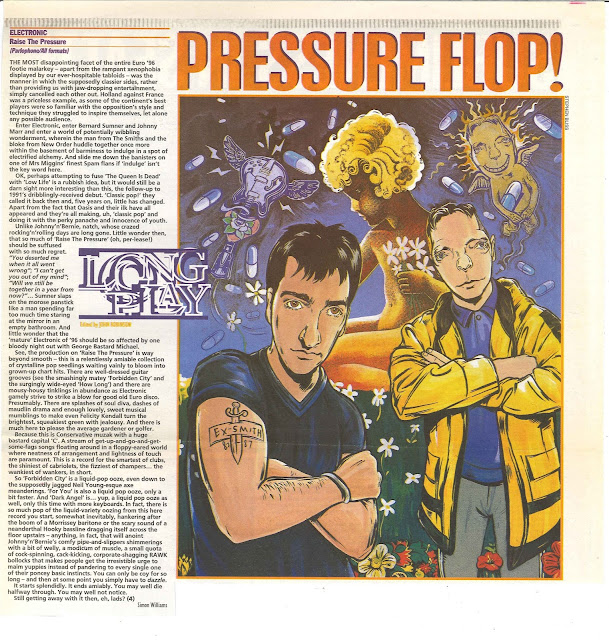Electronic - "Raise The Pressure" NME Review
PRESSURE FLOP!
ELECTRONICRaise The Pressure
[Parlophone/All formats]
THE MOST disappointing facet of the entire Euro '96 footie malarkey — apart from the rampant xenophobia displayed by our ever-hospitable tabloids — was the manner in which the supposedly classier sides, rather than providing us with jaw-dropping entertainment, simply cancelled each other out. Holland against France was a priceless example, as some of the continent's best players were so familiar with the opposition's style and technique they struggled to inspire themselves, let alone any possible audience.
Enter Electronic, enter Bernard Sumner and Johnny Marr and enter a world of potentially wibbling wonderment, wherein the man from The Smiths and the bloke from New Order huddle together once more within the basement of barminess to indulge in a spot of electrified alchemy. And slide me down the banisters on one of Mrs Miggins' finest Spam flans if 'indulge' isn't the key word here.
OK, perhaps attempting to fuse 'The Queen Is Dead' with 'Low Life' is a rubbish idea, but it would still be a darn sight more interesting than this, the follow-up to 1991's dribblingly-received debut. 'Classic pop!' they called it back then and, five years on, little has changed. Apart from the fact that Oasis and their ilk have all appeared and they're all making, uh, 'classic pop' and doing it with the perky panache and innocence of youth.
Unlike Johnny'n'Bernie, natch, whose crazed rocking'n'rolling days are long gone. Little wonder then, that so much of 'Raise The Pressure' (Oh, per-lease!) should be suffused with so much regret. "You deserted me when it all went wrong"; "l can't get you out of my mind"; 'Will we still be together in a year from now?"... Sumner slaps on the morose panstick like a man spending far too much time staring at the mirror in an empty bathroom. And little wonder that the 'mature' Electronic of '96 should be so affected by one bloody night out with George Bastard Michael.
See, the production on 'Raise The Pressure' is way beyond smooth — this is a relentlessly amiable collection of crystalline pop seedlings waiting vainly to bloom into grown-up chart hits. There are well-dressed guitar grooves (see the smashingly matey 'Forbidden City' and the surgingly wide-eyed 'How Long') and there are mousy-housy tinklings in abundance as Electronic gamely strive to strike a blow for good old Euro disco. Presumably. There are splashes of soul diva, dashes of maudlin drama and enough lovely, sweet musical mumblings to make even Felicity Kendall turn the brightest, squeakiest green with jealousy. And there is much here to please the average gardener or golfer.
Because this is Conservative muzak with a huge bastard capital 'C'. A stream of get-up-and-go-and-get-some-fags songs floating around in a floppy-eared world where neatness of arrangement and lightness of touch are paramount. This is a record for the smartest of clubs, the shiniest of cabriolets, the fizziest of champers... the wankiest of wankers, in short.
So 'Forbidden City' is a liquid-pop ooze, even down to the supposedly jagged Neil Young-esque axe meanderings. 'For You' is also a liquid pop ooze, only a bit faster. And 'Dark Angel' is... yup, a liquid pop ooze as well, only this time with more keyboards. In fact, there is so much pop of the liquid-variety oozing from this here record you start, somewhat inevitably, hankering after the boom of a Morrissey baritone or the scary sound of a neanderthal Hooky bassline dragging itself across the floor upstairs — anything, in fact, that will anoint Johnny'n'Bernie's comfy pipe-and-slippers shimmerings with a bit of welly, a modicum of muscle, a small quota of cock-spinning, cack-kicking, corporate-shagging RAWK bollocks that makes people get the irresistible urge to maim yuppies instead of pandering to every single one of their poncey basic instincts. You can only be coy for so long — and then at some point you simply have to dazzle.
It starts splendidly. It ends amiably. You may well die halfway through. You may well not notice.
Still getting away with it then, eh, lads? (4)
Simon Williams

Comments
Post a Comment